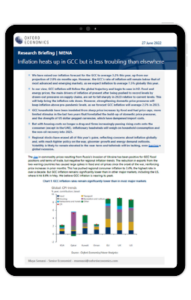Fossil-fuel subsidies hinder the clean energy transition in the MENA
 The MENA region is a key player in the energy sector as a large producer of oil and gas, but over time, it has also come to be a significant energy consumer. Growth and development in Middle East and North Africa (MENA) countries have fuelled an appetite for energy, much of it satisfied by oil and natural gas. This carbon-intensive mix has been enabled by low fossil-fuel energy prices thanks to generous government subsidies. Removing subsidies is politically challenging and difficult in a high-price fossil fuel environment.
The MENA region is a key player in the energy sector as a large producer of oil and gas, but over time, it has also come to be a significant energy consumer. Growth and development in Middle East and North Africa (MENA) countries have fuelled an appetite for energy, much of it satisfied by oil and natural gas. This carbon-intensive mix has been enabled by low fossil-fuel energy prices thanks to generous government subsidies. Removing subsidies is politically challenging and difficult in a high-price fossil fuel environment.
What you will learn:
- It will be particularly hard for MENA where subsidised fuel and low energy prices are key features of its energy market and an integral aspect of the social contract.
- That said, removing subsidies is the first step towards effective carbon pricing.
- While higher energy prices would better reflect the negative effects of emissions, they would also
lead to a short-term inflationary shock.
Tags:
Related Services

Service
MENA Forecasting Service
Monitor the implications of economic and market developments in the MENA region.
Find Out More
Service
African and Middle Eastern Cities Forecasts
Comprehensive data and forecasts for major cities in Africa and the Middle East.
Find Out More
Service
Africa Forecasting Service
Comprehensive analysis of immediate and long-term economic and political prospects to inform investment strategies, expansion and African operations through forecasts and commentary by country, industry, and city.
Find Out More